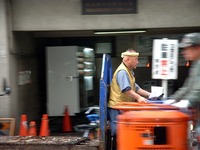 |
| Angelika/Mike Schilli |
|
Michael On our temple tours (Angelika was struck by what I called "temple mania"), we encountered a large number of students on school trips who apparently had an English class assignment to complete in addition to sightseeing. Groups of four, consisting of around seventh graders, had to approach one of the few foreign tourists (about five out of a hundred visitors) and ask them a few questions in English, jot down the answers, and take a group photo as proof.
It was hilarious to secretly watch the children as they overcame their hesitation to make the first contact. An older teacher joined a group of two girls and two boys, approached some American tourists who were already happily willing to answer the questions, but then the two boys lost their nerve and bolted in panic down the temple steps. We were asked a total of four times by different groups at different temples where we were from ("Germany" was unfamiliar to them, the Japanese "Doitsu" was more common), how old we were (around 20), and what we liked about Japan (under Angelika's eye-rolling, I listed the different beer brands). The children's English skills were not very advanced, so the teacher often had to step in and translate our answers.
In Japan, it seems that English classes are conducted in Japanese, focusing on dry grammar rules. Most children can't speak English at all. According to our findings, most have studied English for six years, three hours a week. What happens there is a mystery to me. English classes in Germany during my school days were also quite ridiculous (so out of touch with reality that most people couldn't even make a phone reservation at a hotel after nine years of school English), but I knew the word for "soapbox race," knew what happened in 1066, and could engage in discussions on various topics.


































